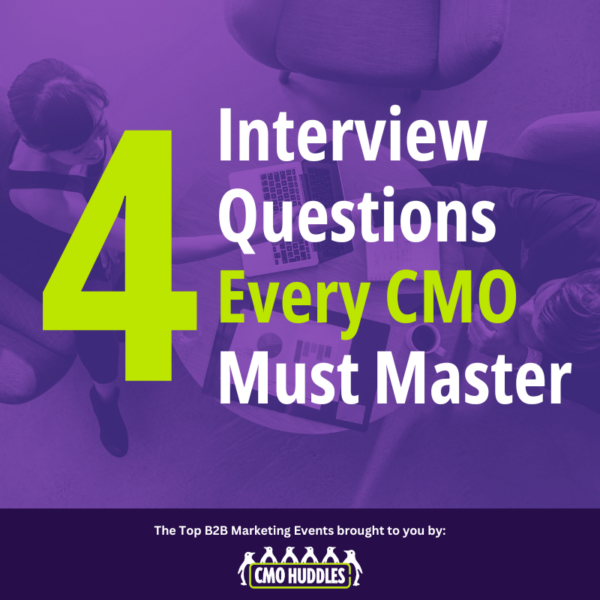
4 Interview Questions Every CMO Must Master
Forget rehearsing canned answers to predictable questions.
In a recent CMO Huddles session for our members in transition, Drew Neisser interviewed negotiation strategist Jacob Warwick about transforming executive interviews from interrogations into strategic conversations.
Warwick revealed how marketing leaders can take control of the process, build champions across the organization, and negotiate from a position of strength—all while remaining authentic and honest.
Below, find four interview land mines and how to defuse them.
1. "Tell me about yourself?" (AKA "Please ramble aimlessly for 20 minutes")
We've all been there—sweating through this seemingly innocent opener while mentally scrolling through our entire life story. According to Warwick, this question is the perfect opportunity to demonstrate executive presence by doing exactly what most candidates don't: Keeping it brief and flipping the script.
His approach:
"I've been in marketing my entire life with varying difficulty of roles, leading teams up to 100, finally landing in the CMO position over the last 5 years or so. I imagine we're going to have a lot to talk about. But I'm curious... what excites you about my background?"
Boom. Suddenly, you're:
- Showcasing your confidence in 30 seconds flat
- Getting valuable intel about what they're really looking for
- Demonstrating that you lead conversations, not just follow them
- Setting the tone for a peer-level discussion, not an interrogation
For bonus points, Warwick suggests what he calls "bragging through the lens of a third party" aka bringing what you learned in one conversation to another. This turns the social dynamics in your favor while signaling you're paying attention throughout the process.
Read more here.
2. "What's next for you?" (Translation: "Will you bolt after a year?")
Rather than stumbling through vague aspirations or pretending this specific role is your ultimate dream, Warwick recommends a power move: position yourself as the one doing the selecting.
Try this language on for size:
"The company I choose to work for next will need to tick certain boxes. One of the reasons I'm excited to talk to you today is because it looks like, at least on paper, I have about 8 of those 10 boxes ticked."
Notice the psychology at play here. You're not desperately trying to fit yourself into their box—you're evaluating whether they meet your standards. This subtle shift:
- Signals you're a discerning executive with options
- Creates healthy tension that makes them want to prove their value to you
- Sets the stage for honest conversations about potential misalignments
- Positions you as someone who makes strategic career moves, not desperate jumps
Read more here.
3. "Why did you leave?" (The question that makes candidates squirm)
Most executives enter interviews dreading this question, mentally rehearsing sanitized half-truths. Warwick's refreshing take? "Run towards the truth, not trying to sugarcoat a turd."
His approach turns vulnerability into strength:
"I'm specifically interested in speaking with the board and the CFO because, if I'm honest, in my last position, I failed to do that. I missed my opportunity for the alignment that's necessary, and I want to make sure I don't repeat that mistake."
This kind of candor is disarming and powerful. It:
- Shows genuine self-awareness and growth mindset
- Demonstrates you learn from experiences rather than blame others
- Builds authentic connection through vulnerability
- Turns potential negatives into evidence of your evolution as a leader
Even better, Warwick suggests proactively addressing this before it's asked, eliminating the anxiety cloud that can hang over the entire interview.
Read more here.
4. "How much money do you want?" (The compensation trap)
When this question drops, most candidates either lowball themselves out of anxiety or throw out an aspirational number without context. Both approaches can backfire spectacularly.
Warwick's unequivocal advice: Never be the first to mention a specific number.
Instead, try:
"Respectfully, I don't talk about compensation until we're ready to make a written offer."
If they push (and they often will), pivot with:
"I know all companies compensate differently. I'm typically paid in the upper percentile of base comp and I'm no stranger to performance bonuses. Does avoiding this conversation now stop us from moving forward?"
This approach prevents the scenario Warwick has seen repeatedly: you name a figure early in the process, the role expands significantly through multiple interviews, and yet the company anchors to your initial number—putting you in an awkward negotiating position.
Read more here.
The Executive's Mindset
By approaching interviews as a peer-level executive exploring a potential partnership, you signal your value before you even start the job. You demonstrate the very leadership qualities they're hiring for through the interview process itself.
The next time you prepare for an executive interview, remember: You're not just answering questions—you're showcasing how you think, how you lead, and how you'll transform their organization.
And isn't that what marketing leadership is all about?
More from Jacob Warwick
· Subscribe to his Execs in the City blog for ongoing interview insights
· Explore his PACE© Job Search Course for in-depth training
· Connect with him on LinkedIn for personalized career advice
About CMO Huddles: CMO Huddles is the only marketing community dedicated to saving B2B CMOs… and penguins! This flocking awesome community now supports over 450 marketing leaders, helping them learn, network, and build their brands. To learn more, visit cmohuddles.com.